科学家有祖国
科学家爱国故事
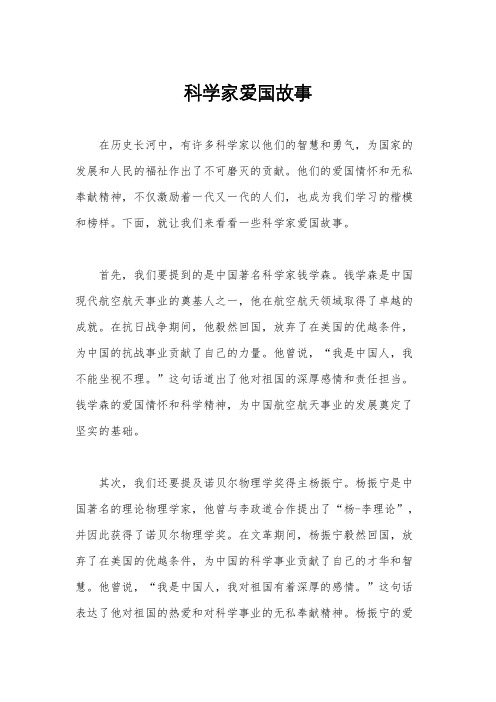
科学家爱国故事在历史长河中,有许多科学家以他们的智慧和勇气,为国家的发展和人民的福祉作出了不可磨灭的贡献。
他们的爱国情怀和无私奉献精神,不仅激励着一代又一代的人们,也成为我们学习的楷模和榜样。
下面,就让我们来看看一些科学家爱国故事。
首先,我们要提到的是中国著名科学家钱学森。
钱学森是中国现代航空航天事业的奠基人之一,他在航空航天领域取得了卓越的成就。
在抗日战争期间,他毅然回国,放弃了在美国的优越条件,为中国的抗战事业贡献了自己的力量。
他曾说,“我是中国人,我不能坐视不理。
”这句话道出了他对祖国的深厚感情和责任担当。
钱学森的爱国情怀和科学精神,为中国航空航天事业的发展奠定了坚实的基础。
其次,我们还要提及诺贝尔物理学奖得主杨振宁。
杨振宁是中国著名的理论物理学家,他曾与李政道合作提出了“杨-李理论”,并因此获得了诺贝尔物理学奖。
在文革期间,杨振宁毅然回国,放弃了在美国的优越条件,为中国的科学事业贡献了自己的才华和智慧。
他曾说,“我是中国人,我对祖国有着深厚的感情。
”这句话表达了他对祖国的热爱和对科学事业的无私奉献精神。
杨振宁的爱国情怀和科学精神,为中国的科学事业注入了强大的动力。
最后,我们还要提到中国著名的生物学家屠呦呦。
屠呦呦是中国科学院院士,她曾因发现了青蒿素而获得了诺贝尔生理学或医学奖。
在中国抗日战争和解放战争期间,屠呦呦毅然留在了祖国,为了国家的发展和人民的健康作出了巨大的贡献。
她曾说,“我是中国人,我应该为中国人民的健康贡献自己的力量。
”这句话表达了她对祖国的深厚感情和对人民健康的无私奉献精神。
屠呦呦的爱国情怀和科学精神,为中国的医学事业做出了重要的贡献。
总之,科学家的爱国故事,不仅是对祖国的热爱和对人民的无私奉献,更是对科学事业的坚守和对真理的追求。
他们的爱国情怀和科学精神,激励着一代又一代的人们,成为我们学习的楷模和榜样。
让我们铭记这些伟大的科学家,传承他们的爱国情怀和科学精神,为祖国的繁荣昌盛贡献自己的力量。
怎么理解科学无国界,科学家有祖国

怎么理解科学无国界,科学家有祖国?1. 科学无国界的概念科学是一种客观、普遍的知识体系,它超越了国界和种族,是全人类共同的财富。
科学无国界的概念强调了科学研究的普遍性和国际性。
无论来自哪个国家的科学家,都可以共同探索自然规律,共同推动人类文明的进步。
在今天全球化的背景下,科学无国界的理念更加重要,它促使不同国家的科学家能够开展合作研究,解决全球性的问题,共同应对挑战。
2. 科学家有祖国的理解科学家作为一个国家的一员,无论是受过教育、工作的地方还是个人的情感上都与其祖国息息相关。
科学家有责任为自己的祖国做出贡献,为国家的科学技术发展、经济繁荣和人民福祉做出努力。
这种责任和担当并不影响科学家们在国际合作中的地位和声誉,相反,科学家们应该通过国际交流合作获得更多的支持和认可,为祖国的发展带来更多的科学研究成果。
3. 科学无国界与科学家有祖国的统一科学无国界与科学家有祖国并不矛盾,而是互相促进的。
科学家们可以在跨国合作中共享知识、经验和资源,共同攻克科学难题,推动科学知识和技术的发展。
通过对国家科技发展战略的支持,科学家们也能够更好地发挥自己在国家建设和发展中的作用,实现科学研究成果与国家利益的统一。
4. 科学无国界与国家利益的平衡在开展国际科学合作的过程中,科学家们需要在科学无国界和国家利益之间保持平衡。
科学无国界的理念要求科学家们摒弃地域和政治偏见,以客观、开放的态度对待科学研究,避免受外部利益的影响。
另科学家们也要根据自己的国家利益和需要,选择合适的合作伙伴,推动国家科技发展和经济建设。
5. 结语科学无国界,而科学家有祖国。
这并不是一种矛盾,而是一种统一。
科学家们应该树立全人类命运共同体的意识,以科学无国界的理念促进国际交流合作,共同推动科学知识和技术的发展。
科学家们也要以国家利益为重,为自己的祖国做出贡献,实现科学研究成果与国家利益的统一。
在这种统一下,科学家们能够更好地发挥自己在国际科学事业和国家建设中的作用,为人类和国家的发展做出更加积极的贡献。
崇高的科学家精神

崇高的科学家精神新中国成立以来,从两弹一星到载人航天、银河系列计算机、网络通信5G技术、高产杂交水稻、生物技术,北斗导航……,科技进步支撑着中国工业、农业、国防日新月异的进步发展,给人民生活水平日益提高提供了巨大的动力。
广大科技工作者在祖国大地上树立起一座座科技创新的丰碑,也铸就了独特的精神气质,形成了崇高的科学家精神。
什么是科学家精神?主要内容有以下六个方面:一、胸怀祖国、服务人民的爱国精神。
从李四光、钱学森、钱三强、邓稼先等一大批老一辈科学家,到陈景润、黄大年、南仁东等一大批新中国成立后成长起来的杰出科学家,都是爱国科学家的典范。
钱学森在美国已经是处于领导地位的一流火箭专家,享受着优厚的待遇,拥有了许多人一辈子梦寐以求的地位、名誉和舒适的生活,但他从未准备在美国长期生活,始终想着要回到祖国,把所学的知识用来报效祖国。
1950年9月7日,钱学森遭到美国司法部的无理逮捕,这位在万里之外的海外赤子,孤身一人,面对强大的势力,不仅没有屈服,而且表现得如此勇敢和无畏,令人肃然起敬。
让美国的新闻记者都惊呼,被审讯的不是钱学森,而是检察官!1955年经过多番磨难,钱学森终于回到了祖国。
自1958年4月起,他长期担任火箭导弹和航天器研制的技术领导职务,为中国火箭和导弹技术的发展提出了极为重要的实施方案——为中国火箭、导弹和航天事业的发展作出了不可磨灭的巨大贡献,被人们尊为“中国火箭之父”。
钱学森是诸多爱国科学家之一。
科学无国界,科学家有祖国。
我国科技事业取得的历史性成就,是一代又一代矢志报国的科学家前赴后继、接续奋斗的结果。
二、勇攀高峰、敢为人先的创新精神。
勇攀高峰、敢为人先,要有卓绝的勇气。
正所谓:无限风光在险峰。
正因为攀登高峰危险而艰辛,山顶的风景才格外高远而壮阔。
科技创新要想人之不敢想,做人之不敢做,凡要突破,必然面临风险;成功之路,没有捷径和坦途,必然需无数次试错和失败铺就。
“时代楷模”南仁东,花费22年让“中国天眼”从设想变成现实,他用自己的腿脚丈量每一座塔的塔顶高度,在近70岁高龄时还亲自参与“小飞人”载人试验。
大力弘扬科学家精神 建设世界科技强国

大力弘扬科学家精神建设世界科技强国陈贤习近平总书记在科学家座谈会上指出,科学成就离不开精神支撑,科学家精神是科技工作者在长期科学实践中积累的宝贵精神财富,并勉励广大科技工作者大力弘扬科学家精神,肩负起历史赋予的科技创新重任。
习近平总书记的重要讲话为广大科技工作者进一步弘扬科学家精神、勇攀科技和道德双高峰指明了前进方向、提供了科学遵循,对于加快科技创新步伐,努力建设世界科技强国,具有重要指导意义。
胸怀祖国,服务人民爱国是科学家精神的灵魂。
习近平总书记指出:“科学无国界,科学家有祖国。
我国科技事业取得的历史性成就,是一代又一代矢志报国的科学家前赴后继、接续奋斗的结果。
”新中国成立之初,我国的科技基础极为薄弱,科技事业几乎从零开始起步。
1956年,以毛泽东同志为核心的第一代中央领导集体向全党全国发出“向科学进军”的号召,并确立了“重点发展,迎头赶上”的科技工作方针。
在那个激情燃烧的年代,李四光、钱学森、钱三强、邓稼先等一大批科学家,秉承强烈的爱国情怀,在极为困难的条件下坚持自力更生、艰苦奋斗,创造了包括“两弹一星”在内的一系列举世瞩目的重大科技奇迹,为我国科技事业发展奠定了重要基础,更给后人留下了十分宝贵的精神财富。
1978年,邓小平同志在全国科学大会上作出“科学技术是生产力”的重要论断,全党全国进一步统一思想、明确目标,我国迎来“科学的春天”。
孙家栋、袁隆平、王选等一大批杰出科学家坚持科学报国、科技为民,取得了载人航天工程、超级杂交水稻、汉字激光照排系统等重大科技创新成果,有力支撑了我国经济社会发展。
党的十八大以来,以习近平同志为核心的党中央高度重视科技创新工作,坚持把科技创新摆在国家发展全局的核心位置,将创新作为引领发展的第一动力,我国科技事业取得历史性成就、发生历史性变革。
量子科技、铁基超导、中微子等前沿领域取得一批重大原创成果,载人航天与探月、全球卫星导航、大型客机等重大科技成果相继问世,FAST 工程等一大批重大科技基础设施陆续建成,涌现出了黄大年、南仁东、钟扬、屠呦呦、李保国等一大批爱国科学家。
案例六:科学没有国界,但科学家有祖国
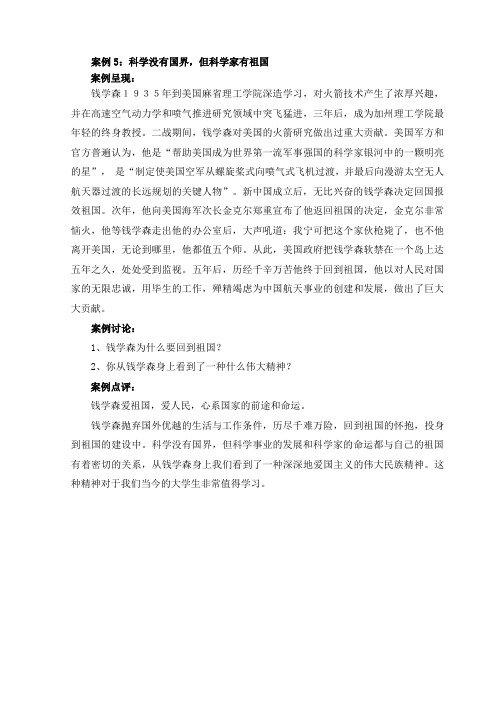
案例5:科学没有国界,但科学家有祖国
案例呈现:
钱学森1935年到美国麻省理工学院深造学习,对火箭技术产生了浓厚兴趣,并在高速空气动力学和喷气推进研究领域中突飞猛进,三年后,成为加州理工学院最年轻的终身教授。
二战期间,钱学森对美国的火箭研究做出过重大贡献。
美国军方和官方普遍认为,他是“帮助美国成为世界第一流军事强国的科学家银河中的一颗明亮的星”,是“制定使美国空军从螺旋桨式向喷气式飞机过渡,并最后向漫游太空无人航天器过渡的长远规划的关键人物”。
新中国成立后,无比兴奋的钱学森决定回国报效祖国。
次年,他向美国海军次长金克尔郑重宣布了他返回祖国的决定,金克尔非常恼火,他等钱学森走出他的办公室后,大声吼道:我宁可把这个家伙枪毙了,也不他离开美国,无论到哪里,他都值五个师。
从此,美国政府把钱学森软禁在一个岛上达五年之久,处处受到监视。
五年后,历经千辛万苦他终于回到祖国,他以对人民对国家的无限忠诚,用毕生的工作,殚精竭虑为中国航天事业的创建和发展,做出了巨大大贡献。
案例讨论:
1、钱学森为什么要回到祖国?
2、你从钱学森身上看到了一种什么伟大精神?
案例点评:
钱学森爱祖国,爱人民,心系国家的前途和命运。
钱学森抛弃国外优越的生活与工作条件,历尽千难万险,回到祖国的怀抱,投身到祖国的建设中。
科学没有国界,但科学事业的发展和科学家的命运都与自己的祖国有着密切的关系,从钱学森身上我们看到了一种深深地爱国主义的伟大民族精神。
这种精神对于我们当今的大学生非常值得学习。
钱学森作为一个科学家的爱国情怀

钱学森作为一个科学家的爱国情怀荣正通科学无国界,但科学家有祖国。
钱学森能取得卓越的科学成就,成为世界知名科学家和中国航天事业的奠基人,是与他对祖国的热爱分不开的。
爱国主义这条主线贯穿了钱学森的传奇人生。
热血青年立志报国在北师大附中就读期间,钱学森在无意中得知来自农村的同学都是在来北京的路上第一次看到火车。
他的内心受到了强烈的震撼,觉得祖国的交通太落后了,这样的国家怎么能富强起来?钱学森以振兴中华为己任,决意日后攻读火车制造专业,设计制造中国自己的火车,力行实业救国。
1929年从中学毕业后,他以第三名的优异成绩考入上海交通大学机械工程系的铁道机械工程专业。
当钱学森如饥似渴地求学时,1932年“一·二八”事变爆发了。
日军飞机对上海市区进行了狂轰滥炸,造成了巨大的生命和财产损失。
这给他留下了深刻的印象,使他认识到飞机与制空权在现代战争中的重要性。
中国当时没有像样的航空工业,急需航空工程方面的人才。
国家兴亡,匹夫有责。
钱学森决心争取出国留学,以后做一名优秀的飞机设计师,为国防建设贡献绵薄之力。
这是钱学森的第一次改变专业方向。
1934年暑假,钱学森考取了清华大学的赴美公费留学,专业是飞机设计。
在赴美留学前,清华大学安排他去各地实习,以补习相关知识。
在飞机修理厂,钱学森亲眼目睹中国空军的落后,发誓要在美国学会制造飞机的全部知识,回来造出最先进的飞机,把日本侵略者赶出去!1935年钱学森赴美留学前夕,同学们纷纷赠言留念,期待他学成归来,报效祖国。
临行前,钱学森向交通大学同学、地下党员戴中孚表露过自己的心声:“现在中国政局混乱,豺狼当道,我到美国去学技术是暂时的,学成之后,一定回来为祖国效力。
”戴中孚赞许道:“你的想法很好。
中国确实有很多事情要做。
你学成归国后是大有可为的!”1935年8月,钱学森从上海乘船前往美国留学。
进入麻省理工学院后,他怀着强烈的民族自尊心和自信心,刻苦学习,只用一年时间就拿下了航空硕士学位。
科学无国界,科学家有祖国

科学无国界,科学家有祖国作者:王洪鹏周广刚来源:《中关村》2021年第11期1840年鸦片战争以来,由于西方列强的入侵,封建统治的腐败,中国逐渐成为半殖民地半封建社会。
那时山河破碎、生灵涂炭,中华民族遭受了前所未有的苦难。
面对苦难,中国人民没有屈服,而是挺起脊梁、奋起抗争。
一批爱国知识分子也积极寻求救亡图存之路,寄希望于科学救民族于危亡、携民众出水火。
在这一过程中,一批爱国知识分子不仅形成了科学救国和科学立国思想,而且注重科学家的作用。
他们认为“科学家之精神,在寻求真理;科学家之目的,在造福人类。
故能称得起科学家之人,不独其在专门学问上,有精深之造诣,而其道德人格,亦必高尚纯洁,有深邃之修养。
”中国共产党创始人和最早的一批党员中,相当一部分人具有近代科学技术背景或较早接受了民主、科学的思想,他们对于在中国发展科学技术的重要性比其同代人理解得更深切更全面。
1919年,陈独秀在《新青年》第六卷第一号发表《本志罪案之答辩书》,大力宣扬“德先生”(Democracy,民主)和“赛先生”(Science,科学)。
他说:“我们现在认定只有这两位先生可以救治中国政治上、道德上、学术上、思想上的一切黑暗。
”革命老人徐特立在延安低矮的窑洞里,写道:“科学,你是国力的灵魂,同时又是社会发展的标志。
所以,前进的政党必然把握先进的科学。
”爱国精神是科学家精神的基础。
爱国主义是中华民族精神的核心。
我国知识分子历来有浓厚的家国情怀和强烈的社会责任感。
“天下兴亡,匹夫有责”“苟利国家生死以,岂因祸福避趋之”等爱国思想,是一代又一代中国知识分子的人生追求。
科学家是知识分子中的优秀代表。
新中国建立初期,在欧美学有所成的一批科学家,他们坚信共产党一定能够带领全国人民创造一片新天地,毅然放弃国外优越的生活和科研环境,回到一穷二白的祖国参加社会主义建设。
曾任中国科协主席的钱学森,始终把祖国和人民放在第一位,放弃在国外的优越生活条件,投入百废待兴的祖国怀抱,体现了倾尽所学报效国家、服务人民的赤子之心和爱国之情。
科学无国界但科学家有祖国这句话的理解

科学无国界但科学家有祖国这句话的理解从思政课教学角度,对这句话作以下解读:
1.科学是反映客观世界本质联系及其运动规律的知识体系,它具有客观性和真理性。
科学本身是没有阶级性和民族性的,它可以超越国界和民族,并造福全人类,所以科学是无国界的。
2.科学家作为创造科学知识的主体,他们是社会人,他们总是生活在不同的国家或地区,会受到他所处社会的文化、习俗等影响,并形成自己的世界观、人生观和价值观,从而被打上国家或阶级的烙印。
所以科学家是有祖国的。
3.在现实国际竞争中,每个国家都有自身的利益,而国家利益又直接关系每个公民的切身利益。
科学家应树立正确国家观民族观,应为自己的祖国发展作出贡献,维护和实现国家利益。
4.有些人标榜自己是为人类服务做世界公民,哪里条件优越,哪里待遇优厚就去哪里,其实质是为个人私欲服务。
作为一名科学家,首先应是爱国主义者,应有服务国家,造福同胞的家国情怀,同时也应是国际主义者,也要有跨越国界、携手合作,为全人类创造更美好明天的胸怀。
和科学有关的名言警句
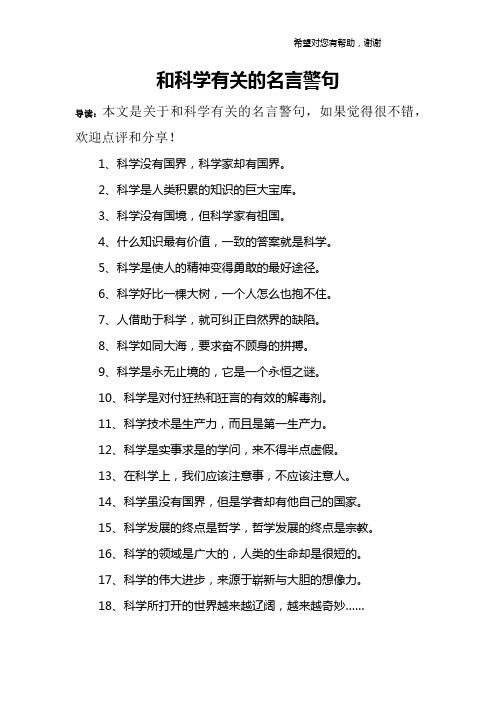
和科学有关的名言警句导读:本文是关于和科学有关的名言警句,如果觉得很不错,欢迎点评和分享!1、科学没有国界,科学家却有国界。
2、科学是人类积累的知识的巨大宝库。
3、科学没有国境,但科学家有祖国。
4、什么知识最有价值,一致的答案就是科学。
5、科学是使人的精神变得勇敢的最好途径。
6、科学好比一棵大树,一个人怎么也抱不住。
7、人借助于科学,就可纠正自然界的缺陷。
8、科学如同大海,要求奋不顾身的拼搏。
9、科学是永无止境的,它是一个永恒之谜。
10、科学是对付狂热和狂言的有效的解毒剂。
11、科学技术是生产力,而且是第一生产力。
12、科学是实事求是的学问,来不得半点虚假。
13、在科学上,我们应该注意事,不应该注意人。
14、科学虽没有国界,但是学者却有他自己的国家。
15、科学发展的终点是哲学,哲学发展的终点是宗教。
16、科学的领域是广大的,人类的生命却是很短的。
17、科学的伟大进步,来源于崭新与大胆的想像力。
18、科学所打开的世界越来越辽阔,越来越奇妙……19、科学尊重事实,服从真理,而不会屈服于任何压力。
20、科学是人生中最重要的最美好的和最需要的东西。
21、科学要求每个人有极紧张的工作和伟大的热情。
22、科学尊重事实,不能胡乱编造理由来附会一部学说。
23、通向谬误的道路有千百条,通向真理的道路只有一条。
24、科学的大胆的活动是没有止境的,也不应该有止境。
25、科学就是整理事实,以便从中得出普遍的规律或结论。
26、认识真理的主要障碍不是谬误,而是似是而非的真理。
27、科学研究的进展及其日益扩充的领域将唤起我们的希望。
28、在科学上进步而道义上落后的人,不是前进,而是后退。
29、科学家的成果是全人类的财产,而科学是最无私的领域。
30、因为真理是灿烂的,只要有一个罅隙,就能照亮整个田野。
31、那些没有受过未知事物折磨的人,不知道什么是发现的快乐。
32、要学会做科学中的粗活。
要研究事实,对比事实,积聚事实。
33、科学还不只在智慧训练上是最好的,在首选训练上也是一样。
大学生对中国科学家精神的理解
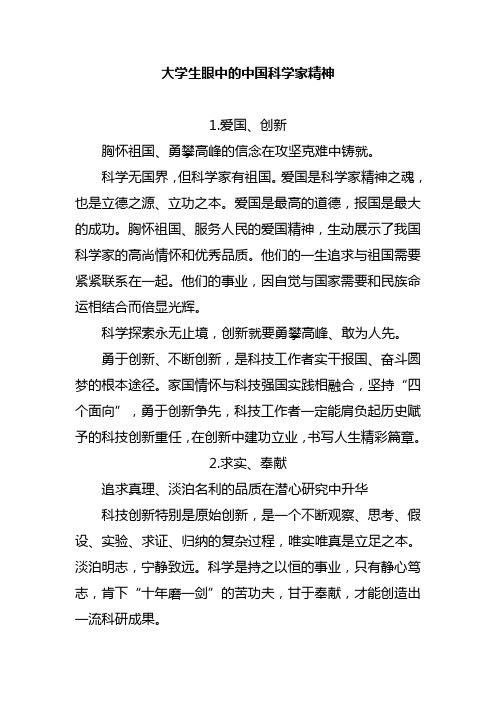
大学生眼中的中国科学家精神1.爱国、创新胸怀祖国、勇攀高峰的信念在攻坚克难中铸就。
科学无国界,但科学家有祖国。
爱国是科学家精神之魂,也是立德之源、立功之本。
爱国是最高的道德,报国是最大的成功。
胸怀祖国、服务人民的爱国精神,生动展示了我国科学家的高尚情怀和优秀品质。
他们的一生追求与祖国需要紧紧联系在一起。
他们的事业,因自觉与国家需要和民族命运相结合而倍显光辉。
科学探索永无止境,创新就要勇攀高峰、敢为人先。
勇于创新、不断创新,是科技工作者实干报国、奋斗圆梦的根本途径。
家国情怀与科技强国实践相融合,坚持“四个面向”,勇于创新争先,科技工作者一定能肩负起历史赋予的科技创新重任,在创新中建功立业,书写人生精彩篇章。
2.求实、奉献追求真理、淡泊名利的品质在潜心研究中升华科技创新特别是原始创新,是一个不断观察、思考、假设、实验、求证、归纳的复杂过程,唯实唯真是立足之本。
淡泊明志,宁静致远。
科学是持之以恒的事业,只有静心笃志,肯下“十年磨一剑”的苦功夫,甘于奉献,才能创造出一流科研成果。
当前,面临激烈的国际竞争,我们更加需要弘扬求实、奉献的精神,要把原始创新能力提升摆在更加突出的位置,努力实现更多“从0到1”的突破。
不论是从事基础研究,瞄准世界一流,还是从事应用研究,解决实际问题,力争实现关键核心技术自主可控,都更加需要科学家们甘坐冷板凳,淡泊名利,勇做新时代科技创新的排头兵。
3.协同、育人集智攻关、甘为人梯的自觉在接力奋斗中凝结。
现代科学发展日新月异,融合深度、广度和复杂程度前所未有,集智攻关、团结协作是大科学时代的必然趋势。
协同是我国科学界的优良传统。
新中国成立以来的科技发展史,也是一部集智攻关、团结协作的历史。
没有万众一心、众志成城的精神,我们就难以创造一个又一个科技发展的奇迹。
科学事业是接力事业,只有薪火相传才能拾级而上、登高望远。
科学事业的未来属于年轻人。
大力弘扬甘为人梯、奖掖后学的育人精神,善于发现、培养青年科技人才,甘做致力提携后学的铺路石,我国的科技事业才能活水涌流、基业长青。
科学没有国界但科学家有祖国英语作文
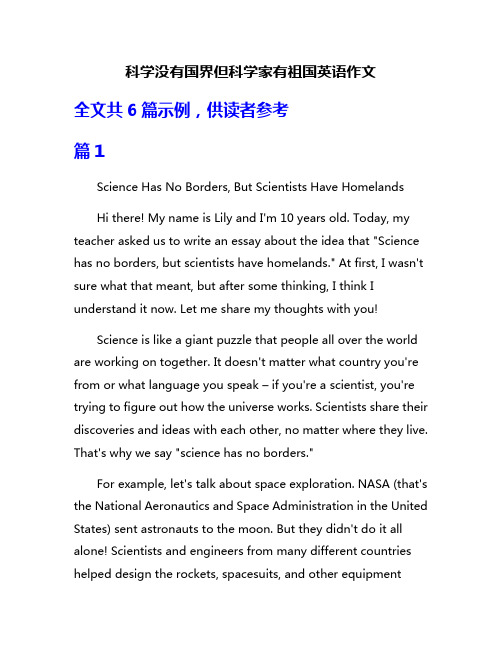
科学没有国界但科学家有祖国英语作文全文共6篇示例,供读者参考篇1Science Has No Borders, But Scientists Have HomelandsHi there! My name is Lily and I'm 10 years old. Today, my teacher asked us to write an essay about the idea that "Science has no borders, but scientists have homelands." At first, I wasn't sure what that meant, but after some thinking, I think I understand it now. Let me share my thoughts with you!Science is like a giant puzzle that people all over the world are working on together. It doesn't matter what country you're from or what language you speak – if you're a scientist, you're trying to figure out how the universe works. Scientists share their discoveries and ideas with each other, no matter where they live. That's why we say "science has no borders."For example, let's talk about space exploration. NASA (that's the National Aeronautics and Space Administration in the United States) sent astronauts to the moon. But they didn't do it all alone! Scientists and engineers from many different countries helped design the rockets, spacesuits, and other equipmentneeded for the mission. Even though the astronauts were American, the science behind the moon landing belonged to people all over the world.Or think about medicine. Doctors and researchers are always working hard to find cures for diseases like cancer, COVID-19, and malaria. They share their research with other scientists globally so that everyone can learn from each other's work. A scientist in India might make a discovery that could lead to a new treatment in Mexico. Science brings the whole world together for the greater good of humanity.But even though science doesn't have borders, scientists themselves have homelands – the countries or cultures they grew up in. Their homelands shape who they are and how they see the world. Let me give you an example from my own life.My best friend Maya is really good at math and science. Her family is from India originally, and she told me that her grandparents used to work on rockets for the Indian Space Research Organization (ISRO). Maybe that's why Maya loves learning about space so much! She's really proud of India's achievements in science and technology.On the other hand, my family is from China, and my parents are always telling me stories about great Chinese scientists andinventors from history. Like Zhang Heng, who invented the first seismometer to detect earthquakes way back in 132 AD! Or Joseph Needham, the British scientist who studied ancient Chinese science and technology. Hearing stories like these makes me feel connected to my Chinese heritage and the long tradition of scientific exploration there.I think every scientist has a homeland that helped shape their curiosity and passion for understanding the world around them. Maybe their homeland inspired their love of nature or gave them role models to look up to. Maybe their cultural traditions encouraged them to ask questions and seek knowledge.At the same time, being part of the global scientific community means scientists get to share ideas and work together with people from all different homelands. They can take pride in their roots while still embracing science as a universal language that brings the whole world closer.In my opinion, having homelands doesn't divide scientists at all. Instead, it makes science richer because we get to combine all the different perspectives, experiences, and ways of thinking that people from diverse backgrounds bring to the table. The morescientists can learn from each other's cultures and traditions, the more amazing discoveries we'll make together.Like my teacher always says, "United minds can conquer any problem!" As long as scientists keep collaborating across borders while celebrating where they came from, there's no limit to what we can achieve. Who knows – maybe someday a scientist like me will find the cure for cancer or figure out how to travel to other planets!For now, I'll just keep studying hard, asking lots of questions, and dreaming big. The world of science is wide open, waiting for kids like me to explore it. No matter where we're from, the universal language of science will help guide the way as we uncover the mysteries of the universe, side by side. What an exciting adventure!篇2Science Has No Borders, But Scientists Have a HomelandHi there! My name is Timmy and I'm 10 years old. Today I want to talk to you about something really important - science and how it relates to countries and borders. It's a big topic but I'll do my best to explain it in a way that makes sense.First, let's talk about what science actually is. Science is all about studying the world around us through observations and experiments to learn how things work. Scientists ask questions, make hypotheses or educated guesses, test those guesses, and then draw conclusions based on the evidence they find. The cool thing about science is that it doesn't care what country you're from or what language you speak. The laws of physics, chemistry, biology and other sciences apply everywhere on Earth (and beyond!).For example, if a scientist in America discovers a new species of frog, that discovery doesn't just belong to America. Scientists all over the world can study that new frog and learn from it. Or if a physicist in China figures out a new equation about how gravity works, every other physicist on the planet can use that equation too. Science has no borders! The knowledge spreads across countries and continents because science is universal. In that way, science belongs to the whole world and brings people together.But here's where it gets a little tricky. Even though science itself doesn't have borders, the scientists who do the science are human beings who live in specific places and have a homeland or country they belong to. Most scientists were born and grew up in a particular country, maybe learned the local language andcustoms, and develop a sense of belonging and loyalty to that place. Their home country helped shape who they are.That homeland connection matters because it can influence what kinds of scientific questions a scientist gets interested in studying. A scientist from a coastal country might be really curious about ocean life and ecosystems. A scientist from the mountains might focus more on geology and landscapes. An astronomer from a country with a great telescope might spend a lot of time studying the stars. You get the idea!Countries also provide funding and resources that allow scientists to do their research. They build universities, labs, telescopes, satellites, and all the tools scientists need. So scientists often feel thankful and loyal to their homeland for giving them the opportunity to be a scientist in the first place.At the same time, scientists have to be objective and follow evidence over any national pride or bias. If the data shows something that contradicts what your home country wants to believe, a good scientist tells the truth about the evidence. Ignoring facts for patriotic reasons wouldn't be real science. That's one of the reasons international collaboration is so vital - scientists from different countries can check each other's work and make sure conclusions are solid.Another reason diversity in science is so valuable is that scientists from diverse backgrounds and cultures can bring new perspectives and different ways of looking at problems. If every scientist studying cancer was from the same country and had the same experiences, they might miss important insights. But including researchers from all over the world increases the chance of a breakthrough. Diversity makes science smarter!Speaking of diversity, let me tell you about a really cool scientist named Dr. Tiera Fletcher. She's an American chemist who grew up loving science but didn't see a lot of people who looked like her in science careers. Now she's achieved great things like creating glow-in-the-dark materials using bioluminescence from fireflies and jellyfish! And she's using her success to inspire more girls and minorities to get involved in STEM fields. She clearly has pride in being an American scientist bringing positive change. But her work and the science behind it can benefit kids all around the globe. That's the power of science without borders!So in the end, while science may be universal and belong to the world, scientists are people who come from somewhere specific and have connections to a homeland culture. Those ties to a particular place don't make their scientific discoveries anyless valid or important. We just have to remember that mixing diverse perspectives and letting the evidence speak for itself, not national loyalty, is what truly advances human knowledge.Thanks for reading my essay! I tried to cover a pretty big concept as best I could. Science is amazing and I can't wait to see what new breakthroughs scientists from all over the world will make next. Stay curious!篇3Science Has No Borders, But Scientists Have a HomelandHi there! My name is Jamie and I'm 10 years old. Today I want to talk to you about something really important - science! Science is super cool and helps us understand the world around us. But did you know that even though science doesn't have any borders or boundaries, the people who do science (called scientists) actually do have a homeland? Let me explain what I mean.Science is universal - it doesn't matter where you're fromOne of the best things about science is that it's the same no matter where you go in the world. The laws of physics, chemistry, biology and all the other sciences apply everywhere, from thebiggest cities to the smallest villages. Whether you're in New York, Tokyo, Rio de Janeiro or a tiny island in the Pacific Ocean, gravity still makes things fall down, water still boils at 212°F (100°C), and plants still need sunlight, water and nutrients to grow. Science has no borders!Scientists from all over have made amazing discoveries and inventions that help people everywhere. For example, the mathematician Pythagoras was from Greece but his famous theorem about right-angled triangles is used by people everywhere today. Or think about Marie Curie who was born in Poland but did her Nobel Prize-winning work on radioactivity in France. Or Albert Einstein from Germany whose theories of relativity revolutionized our understanding of the universe. Science brings people together from all around the world to share ideas and make the world a better place.It doesn't matter what language you speak, what religion you practice, or what country you're a citizen of - if you use the scientific method of observing, experimenting, and analyzing data, then you are a scientist! Science is a universal language that anyone can learn and participate in. That's why lots of big science projects involve teams of researchers from manydifferent countries all working together. Science has no borders and belongs to everyone in the world.But scientists themselves still have homelandsWhile science may be universal and have no borders, the people who do science - the scientists themselves - are still from particular places with their own cultures and backgrounds. Every scientist has a homeland where they grew up learning the language, celebrating the holidays, eating the foods, and absorbing the traditions of that place. You can take the scientist out of their homeland, but you can't take the homeland out of the scientist!For example, Marie Curie may have done her famous work in France, but she was born in Warsaw, Poland and carried her Polish culture, language and identity with her wherever she went. Or think of Albert Einstein - he spent most of his amazing scientific career in places like Switzerland, Germany and the United States. But he was born and raised in Germany, celebrating German holidays, speaking the German language, and being shaped by German culture. His unique perspective as a German scientist contributed to his revolutionary theories about space, time and energy.A scientist's homeland and cultural background can influence how they approach problems and the types of questions they ask. Their native languages, beliefs, values and life experiences all provide a unique lens through which they view the world. By bringing together scientists from diverse homelands, we get teams with multiple perspectives working on solving the biggest challenges facing humanity.Every scientist feels pride for their homelandAnother reason why scientists have a homeland is because it's human nature to feel pride for the place you were born and came from. When a scientist makes an important breakthrough or wins a major award like the Nobel Prize, people in their homeland country feel an extra sense of pride, celebration and joy. The scientist's accomplishments make their whole nation proud!For example, when Donna Strickland won the 2018 Nobel Prize in Physics for her work on high-intensity laser pulses, it was a moment of great national pride for Canadians since she is from Guelph, Ontario. Or in 2014 when Malala Yousafzai was awarded the Nobel Peace Prize at just 17 years old for her advocacy for girls' education, it made all Pakistanis beam with pride that she was from their homeland. Scientists feel immense priderepresenting their homelands on the world stage when they achieve something remarkable.I'll always rep my homeland of Australia when I become a scientist! I can't wait to eat Vegemite sandwiches in the lab and put a Aussie flag on my lab coat. Maybe I'll even name one of my big discoveries "The Sydneyosaurus" or something to represent where I'm from Down Under. No matter how universal science gets, I'll always carry the Aussie spirit with me!Let's celebrate our homelands while coming together through scienceIn the end, we should celebrate the fact that scientists all have their own homelands that shape who they are. The diversity of cultures, perspectives, and experiences that scientists bring from their homelands is what allows science to grow and evolve in creative new ways. Science may be borderless, but it's powered by scientists who are formed by their native lands.At the same time, we should remember that science is a universal, global endeavor that unites people from all around the world. Scientists from every corner of the planet should collaborate and work together to solve problems and expand human knowledge. If we can celebrate our homelands while stillcoming together through the common language of science, that's the best of both worlds!So let's keep repping our homelands while practicing borderless science. I'll be the kid scientist from Australia working with my friends from Japan, Brazil, Tanzania and everywhere else to unlock the mysteries of the universe. We may be from different homelands, but we're all scientists who are part of the same universal human family. United through science, there's no limit to what we can discover and achieve!篇4Science Has No Borders, But Scientists Have a HomelandHi! My name is Alex and I'm 10 years old. Today I want to talk to you about science and how even though science doesn't have any borders or boundaries, the people who do science (called scientists) all have a homeland - a country where they were born and grew up.What is science? Science is about discovering and learning new things about the world around us through observation and experimentation. Scientists study everything - from the tiniest atoms to the biggest galaxies in space! Some scientists study plants and animals. Others study the human body and try to findcures for diseases. Some even study the weather and climate. Scientists are pretty much studying every single thing in the universe to learn how it works.The really cool thing about science is that it doesn't belong to any one country or group of people. Science is universal - it's for everyone in the world to learn and explore no matter where you live. The laws of science, like gravity or how plants grow, are the same everywhere on Earth. When a scientist in China learns something new about black holes, that knowledge belongs to the whole world, not just China. And if a scientist in Brazil discovers a new species of frog, that discovery is for everyone, not just Brazilians. Science has no borders!But even though science itself doesn't have borders, the scientists who do science all come from different homelands or countries. A scientist could be born and raised in France, Japan, Nigeria, Canada, or any other nation in the world. Every scientist has a place they call home - it's the country where they grew up, went to school, and first learned about science as a kid. The homeland shapes who a scientist is and how they view the world. It's a huge part of their identity.My homeland is the United States. I was born in New York City and have lived here my whole life. I love so many thingsabout the US - the diverse people and cultures, the amazing cities, the beautiful national parks. Even though science doesn't belong to any one country, I feel very proud that many important scientists were born in America, like Benjamin Franklin, Thomas Edison, and the Wright Brothers. Their American homeland and upbringing shaped who they were as scientists and inventors.At the same time, the United States has benefited tremendously from brilliant scientists born in other homelands. Albert Einstein was born in Germany before moving to America. Jadav Chandra Bose, who made篇5Science Has No Borders, But Scientists Have a HomelandHi there, my name is Emma, and I'm a 10-year-old student who loves science! Today, I want to share my thoughts on an important topic: "Science has no borders, but scientists have a homeland."What does this phrase mean? Well, let me explain.Science is like a big, beautiful garden filled with knowledge and discoveries. It's a place where curious minds come together to learn about the world around us. Whether you're studyingplants, animals, the stars, or anything else, science helps us understand how things work.Now, when we say "science has no borders," it means that science belongs to everyone, no matter where you're from or what language you speak. Science is like a universal language that everyone can understand and contribute to.For example, let's say a scientist in China makes an amazing discovery about how to grow better crops. That discovery can help farmers all over the world, no matter what country they live in. Science doesn't care if you're Chinese, American, African, or from anywhere else – it's for everyone!But here's the cool part: even though science has no borders, scientists do have a homeland. What does that mean? Well, it means that every scientist comes from a specific place, with its own culture, traditions, and way of life.Imagine a scientist named Aisha from Egypt. She might study science using the same methods as scientists from other countries, but she also brings her own unique perspective and experiences to her work. Maybe she's inspired by the ancient Egyptian pyramids or the Nile River. Her homeland shapes who she is and how she approaches her research.Or think about a scientist named Javier from Mexico. He might be fascinated by the diverse plant life in his country and want to learn more about how different species adapt to their environments. His love for his homeland might inspire him to study biology and help protect the natural world.You see, scientists come from all over the globe, with different backgrounds and stories. But they all share a passion for discovery and a desire to make the world a better place through science.That's why it's so important to have scientists from many different countries and cultures working together. Each one brings their own unique perspective and experiences to the table, and when we combine all those perspectives, we can learn and discover even more!Imagine if only scientists from one country studied space. They might miss out on important insights or ideas from scientists in other parts of the world. But when scientists from different homelands collaborate, they can share their knowledge and push the boundaries of what we know about the universe.The same goes for any field of science – medicine, technology, environmental studies, you name it! By working together and learning from each other's cultures andexperiences, scientists can make incredible breakthroughs that benefit everyone on our planet.So, while science has no borders and belongs to all of humanity, scientists have a special connection to their homelands. Their cultures, traditions, and experiences shape who they are and how they approach their work. And when scientists from different homelands come together, it's like a beautiful tapestry of knowledge and understanding.That's why I love science so much – it's a world of endless discovery, where people from all over the globe can share their ideas and work together to make the world a better place. And even though scientists have different homelands, they're all united by their love of learning and their desire to explore the mysteries of the universe.Who knows, maybe one day I'll become a scientist too, and I can contribute my own unique perspective to the amazing world of science! But for now, I'll keep learning, exploring, and appreciating the incredible diversity of scientists and their homelands.Science has no borders, but scientists have a homeland –and that's what makes science so special and full of wonder.Together, we can unlock the secrets of the universe, one discovery at a time!篇6Science Has No Borders, But Scientists Have a HomelandHi everyone! My name is Emily, and I'm 10 years old. Today, I want to talk to you about something really important – science and scientists. You see, science is amazing! It helps us understand the world around us and creates cool new inventions that make our lives better.But here's the thing – science doesn't belong to any one country or group of people. It's like a big, awesome playground where everyone can come and play, no matter where they're from or what they look like. Science has no borders!Think about it this way: when a scientist in China makes a new discovery, that discovery doesn't just belong to China. It belongs to the whole world! Because science is about sharing knowledge and working together to learn more. Whether you're from America, Japan, Brazil, or anywhere else, you can be a scientist and contribute to making the world a better place.That's the beauty of science – it brings people together from all over the globe to solve problems and explore the mysteries of the universe. It's like one big international team where everyone's ideas are welcome.But here's something important to remember: even though science has no borders, scientists do have a homeland. You see, every scientist comes from somewhere – a place where they grew up, went to school, and learned to love science.For me, that place is the United States of America. I was born here, and I'm proud to be an American. This is my homeland, the place that helped shape who I am today. And you know what? I bet lots of other scientists feel the same way about their own homelands.Maybe there's a scientist in India who feels a special connection to their country and its rich scientific history. Or a scientist in Kenya who is inspired by the amazing wildlife and landscapes of their homeland. Every scientist has a place that made them who they are, and that's something to be proud of.At the same time, being proud of your homeland doesn't mean you can't work with scientists from other countries or appreciate their contributions. In fact, that's one of the coolestthings about science – it brings people together from all over the world to collaborate and share ideas.Imagine if scientists only worked with other scientists from their own country and ignored everyone else's research. That would be terrible! We'd miss out on so many amazing discoveries and inventions. Science thrives when we work together, share our knowledge, and learn from each other's perspectives.That's why it's important to remember that while science has no borders, scientists have homelands – special places that helped shape their love of science and their unique experiences. And by working together and respecting each other's backgrounds, we can make the world an even more amazing place through science.So, let's celebrate our homelands and be proud of where we come from. But let's also remember that science is a global effort, and by collaborating with scientists from all over the world, we can solve the biggest challenges facing our planet.Who knows? Maybe one day, a scientist from America will team up with a scientist from China to cure a deadly disease. Or maybe a scientist from Brazil will work with a scientist from Australia to develop a new type of renewable energy. Thepossibilities are endless when we break down borders and work together in the name of science.At the end of the day, science is a universal language that brings people together. And while scientists may come from different homelands, we all share a common goal: to make the world a better place through knowledge, curiosity, and understanding.So let's keep exploring, learning, and working together as one big global scientific community. Because when it comes to science, there are no borders – only endless possibilities waiting to be discovered!。
夸夸中国科学家句子
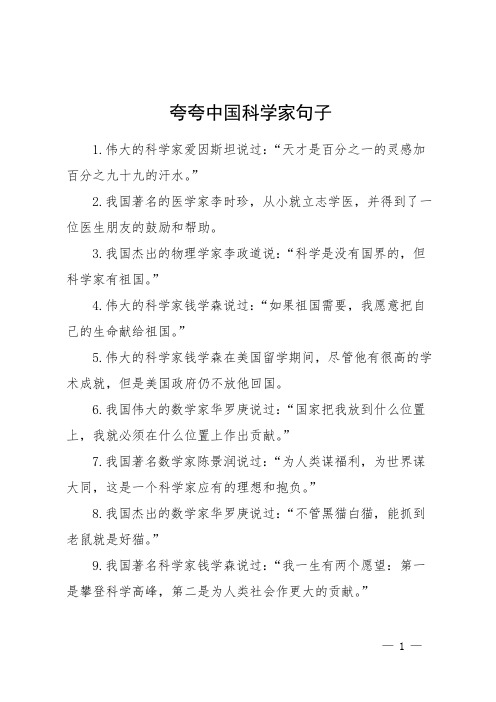
夸夸中国科学家句子
1.伟大的科学家爱因斯坦说过:“天才是百分之一的灵感加百分之九十九的汗水。
”
2.我国著名的医学家李时珍,从小就立志学医,并得到了一位医生朋友的鼓励和帮助。
3.我国杰出的物理学家李政道说:“科学是没有国界的,但科学家有祖国。
”
4.伟大的科学家钱学森说过:“如果祖国需要,我愿意把自己的生命献给祖国。
”
5.伟大的科学家钱学森在美国留学期间,尽管他有很高的学术成就,但是美国政府仍不放他回国。
6.我国伟大的数学家华罗庚说过:“国家把我放到什么位置上,我就必须在什么位置上作出贡献。
”
7.我国著名数学家陈景润说过:“为人类谋福利,为世界谋大同,这是一个科学家应有的理想和抱负。
”
8.我国杰出的数学家华罗庚说过:“不管黑猫白猫,能抓到老鼠就是好猫。
”
9.我国著名科学家钱学森说过:“我一生有两个愿望:第一是攀登科学高峰,第二是为人类社会作更大的贡献。
”
— 1 —
10.著名科学家钱学森说过:“如果我们有自己民族的文化而不去发扬的话,那将是一个最大的耻辱。
”
— 2 —。
20位科学家震撼人心的爱国名言,最后一句令人泪崩
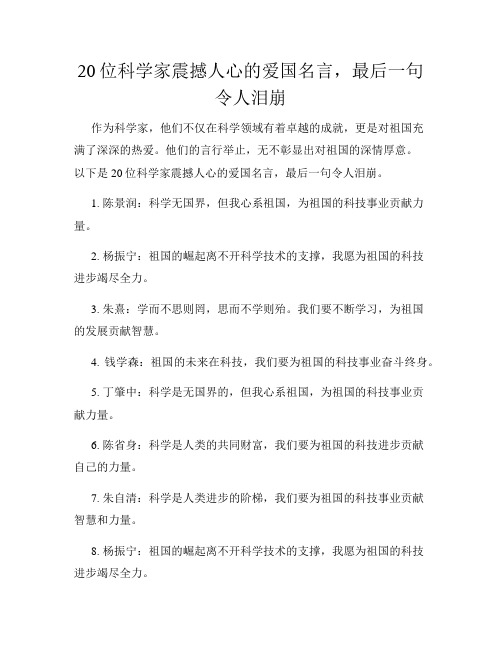
20位科学家震撼人心的爱国名言,最后一句令人泪崩作为科学家,他们不仅在科学领域有着卓越的成就,更是对祖国充满了深深的热爱。
他们的言行举止,无不彰显出对祖国的深情厚意。
以下是20位科学家震撼人心的爱国名言,最后一句令人泪崩。
1. 陈景润:科学无国界,但我心系祖国,为祖国的科技事业贡献力量。
2. 杨振宁:祖国的崛起离不开科学技术的支撑,我愿为祖国的科技进步竭尽全力。
3. 朱熹:学而不思则罔,思而不学则殆。
我们要不断学习,为祖国的发展贡献智慧。
4. 钱学森:祖国的未来在科技,我们要为祖国的科技事业奋斗终身。
5. 丁肇中:科学是无国界的,但我心系祖国,为祖国的科技事业贡献力量。
6. 陈省身:科学是人类的共同财富,我们要为祖国的科技进步贡献自己的力量。
7. 朱自清:科学是人类进步的阶梯,我们要为祖国的科技事业贡献智慧和力量。
8. 杨振宁:祖国的崛起离不开科学技术的支撑,我愿为祖国的科技进步竭尽全力。
9. 丁肇中:科学是无国界的,但我心系祖国,为祖国的科技事业贡献力量。
10. 陈省身:科学是人类的共同财富,我们要为祖国的科技进步贡献自己的力量。
11. 朱自清:科学是人类进步的阶梯,我们要为祖国的科技事业贡献智慧和力量。
12. 钱学森:祖国的未来在科技,我们要为祖国的科技事业奋斗终身。
13. 陈景润:科学无国界,但我心系祖国,为祖国的科技事业贡献力量。
14. 杨振宁:祖国的崛起离不开科学技术的支撑,我愿为祖国的科技进步竭尽全力。
15. 朱熹:学而不思则罔,思而不学则殆。
我们要不断学习,为祖国的发展贡献智慧。
16. 钱学森:祖国的未来在科技,我们要为祖国的科技事业奋斗终身。
17. 丁肇中:科学是无国界的,但我心系祖国,为祖国的科技事业贡献力量。
18. 陈省身:科学是人类的共同财富,我们要为祖国的科技进步贡献自己的力量。
19. 朱自清:科学是人类进步的阶梯,我们要为祖国的科技事业贡献智慧和力量。
20. 杨振宁:祖国的崛起离不开科学技术的支撑,我愿为祖国的科技进步竭尽全力。
科学家的爱国故事
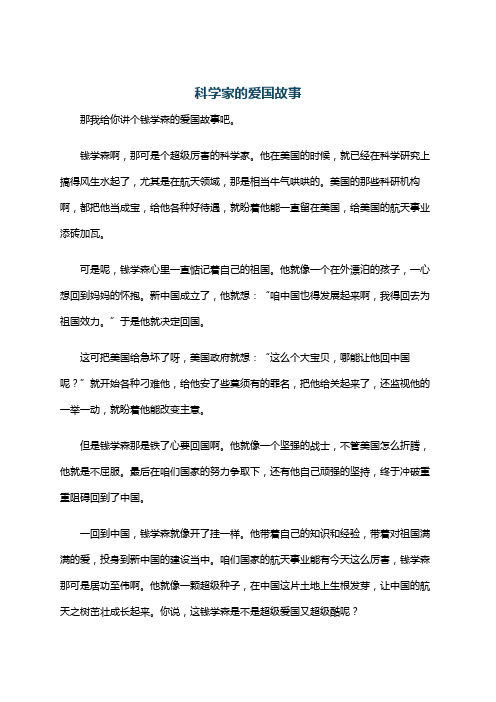
科学家的爱国故事
那我给你讲个钱学森的爱国故事吧。
钱学森啊,那可是个超级厉害的科学家。
他在美国的时候,就已经在科学研究上搞得风生水起了,尤其是在航天领域,那是相当牛气哄哄的。
美国的那些科研机构啊,都把他当成宝,给他各种好待遇,就盼着他能一直留在美国,给美国的航天事业添砖加瓦。
可是呢,钱学森心里一直惦记着自己的祖国。
他就像一个在外漂泊的孩子,一心想回到妈妈的怀抱。
新中国成立了,他就想:“咱中国也得发展起来啊,我得回去为祖国效力。
”于是他就决定回国。
这可把美国给急坏了呀,美国政府就想:“这么个大宝贝,哪能让他回中国呢?”就开始各种刁难他,给他安了些莫须有的罪名,把他给关起来了,还监视他的一举一动,就盼着他能改变主意。
但是钱学森那是铁了心要回国啊。
他就像一个坚强的战士,不管美国怎么折腾,他就是不屈服。
最后在咱们国家的努力争取下,还有他自己顽强的坚持,终于冲破重重阻碍回到了中国。
一回到中国,钱学森就像开了挂一样。
他带着自己的知识和经验,带着对祖国满满的爱,投身到新中国的建设当中。
咱们国家的航天事业能有今天这么厉害,钱学森那可是居功至伟啊。
他就像一颗超级种子,在中国这片土地上生根发芽,让中国的航天之树茁壮成长起来。
你说,这钱学森是不是超级爱国又超级酷呢?。
深植科学精神感悟与心得体会
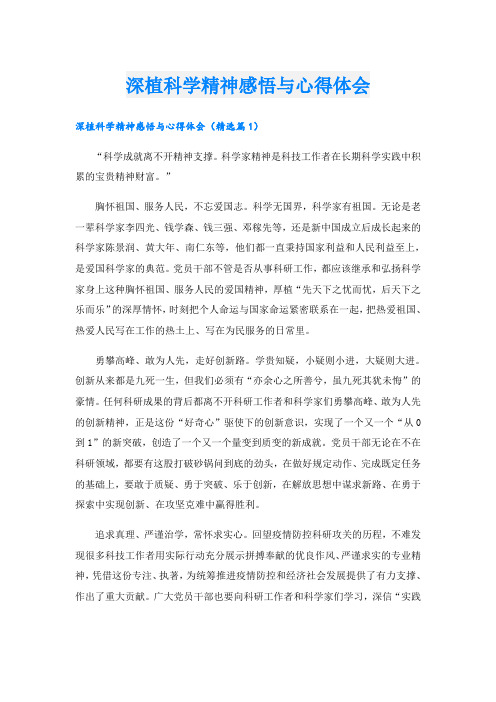
深植科学精神感悟与心得体会深植科学精神感悟与心得体会(精选篇1)“科学成就离不开精神支撑。
科学家精神是科技工作者在长期科学实践中积累的宝贵精神财富。
”胸怀祖国、服务人民,不忘爱国志。
科学无国界,科学家有祖国。
无论是老一辈科学家李四光、钱学森、钱三强、邓稼先等,还是新中国成立后成长起来的科学家陈景润、黄大年、南仁东等,他们都一直秉持国家利益和人民利益至上,是爱国科学家的典范。
党员干部不管是否从事科研工作,都应该继承和弘扬科学家身上这种胸怀祖国、服务人民的爱国精神,厚植“先天下之忧而忧,后天下之乐而乐”的深厚情怀,时刻把个人命运与国家命运紧密联系在一起,把热爱祖国、热爱人民写在工作的热土上、写在为民服务的日常里。
勇攀高峰、敢为人先,走好创新路。
学贵知疑,小疑则小进,大疑则大进。
创新从来都是九死一生,但我们必须有“亦余心之所善兮,虽九死其犹未悔”的豪情。
任何科研成果的背后都离不开科研工作者和科学家们勇攀高峰、敢为人先的创新精神,正是这份“好奇心”驱使下的创新意识,实现了一个又一个“从0到1”的新突破,创造了一个又一个量变到质变的新成就。
党员干部无论在不在科研领域,都要有这股打破砂锅问到底的劲头,在做好规定动作、完成既定任务的基础上,要敢于质疑、勇于突破、乐于创新,在解放思想中谋求新路、在勇于探索中实现创新、在攻坚克难中赢得胜利。
追求真理、严谨治学,常怀求实心。
回望疫情防控科研攻关的历程,不难发现很多科技工作者用实际行动充分展示拼搏奉献的优良作风、严谨求实的专业精神,凭借这份专注、执著,为统筹推进疫情防控和经济社会发展提供了有力支撑、作出了重大贡献。
广大党员干部也要向科研工作者和科学家们学习,深信“实践出真知”,注重理论与实践相结合,大力弘扬追求真理、严谨治学的求实精神,在求真务实中谋划发展、化解难题、探索出路。
淡泊名利、潜心研究,愿做奉献事。
要鼓励科技工作者专注于自己的科研事业,勤奋钻研,不慕虚荣,不计名利。
2023年科学家的名人名言

2023年科学家的名人名言2023年科学家的名人名言11、科学的基础是健康的身体。
——居里夫人2、科学没有国境,但科学家有祖国。
——巴斯德3、我愿用我全部的生命从事科学研究,来贡献给生育我、栽培我的祖国和人民。
——巴甫洛夫4、万事开头难,每门科学都是如此。
——马克思5、真理可能在少数人一边。
——柏拉图6、我平生从来没有做出过一次偶然的发明。
我的一切发明都是经过深思熟虑和严格试验的结果。
——爱迪生7、目前的时代,真理是那样晦暗不明,谎言又是那样根深蒂固,以致除非我们热爱真理,我们便不会认识真理。
——帕斯卡8、对自己不满是任何真正有才能的人的根本特征之一。
——契诃夫9、只有顺从自然,才能驾驭自然。
——培根10、独立思考能力是科学研究和创造发明的一项必备才能。
在历史上任何一个较重要的科学上的创造和发明,都是和创造发明者的独立地深入地看问题的方法分不开的。
——华罗庚11、儿童游戏中常寓有深刻的思想。
——席勒12、我要把人生变成科学的梦,然后再把梦变成现实。
——居里夫人13、在真理的认识方面,任何以权威者自居的人,必将在上帝的嬉笑中垮台!——爱因斯坦14、把语言化为行动,比把行动化为语言困难得多。
——高尔基不经巨大的困难,不会有伟大的事业。
——伏尔泰15、谬误的好处是一时的,真理的好处是永久的;真理有弊病时,这些弊病是很快就会消灭的,而谬误的弊病则与谬误始终相随。
——狄德罗16、天才是百分之一的灵感加上百分之九十九的汗水——爱迪生17、学到很多东西的诀窍,就是一下子不要学很多。
——洛克18、利用时间是一个极其高级的规律。
——恩格斯19、人的天职在勇于探索真理。
——哥白尼20、知识就是力量。
——培根21、当你还不能对自己说今天学到了什么东西时,你就不要去睡觉。
——利希顿堡22、凡在小事上对真理持轻率态度的人,在大事上也是不可信任的。
——爱因斯坦23、有教养的头脑的第一个标志就是善于提问。
——普列汉诺夫24、知识有两种,其一是我们自己精通的问题;其二是我们知道在哪里找到关于某问题的知识。
科学无国界,科学家有祖国。”科学精神的内涵符合这句名言的前半句,科学家精神的内涵符合后半句。

科学无国界,科学家有祖国。
”科学精神的内涵符合这句名言的前半句,科学家精神的内涵符合后半句。
科学无国界一句表达的是科学本身不受国界限制,科学知识和科学发现是普世的,不分国籍和地域。
科学研究是通过共同的方法和原则来追求真理和知识的,不受国家界限和政治利益的制约。
科学精神的内涵就体现了这一点,它强调追求真理、客观判断、质疑权威、合作共享等核心价值观。
无论科学家来自哪个国家,他们都能够在科学领域的交流与合作中相互促进,推动科学的进步。
而“科学家有祖国”一句强调的是科学家作为个体的国籍身份。
虽然科学本身超越了国界,但科学家作为个体,仍然会被其国家的教育体系、科研环境、文化背景等因素所影响,并有各自的国家身份和归属感。
这个句子告诉我们,科学家的研究生活和科学发现也受到个体身份和所属国家的影响,他们会在各自的领域内为了祖国的利益做出贡献。
因此,整体来看,“科学无国界,科学家有祖国”这句名言准确地揭示了科学精神和科学家的心理状态。
科学无国界体现了科学本身的特性和普适性,而科学家有祖国则强调了科学家作为个体的身份和情感归属。
两者相结合,既突出了科学的国际性和普遍性,又关注了科学家的个体国家身份和奉献精神。
科学家回归祖国的事例

科学家回归祖国的事例
科学家回归祖国的事例有很多,以下列举几个:
1. 李四光:中国地质力学的奠基者、新中国科技的奠基者之一。
他早年在日本留学,但后来决定回国为祖国发展贡献力量。
他率领团队找到了属于中国自己的铀矿,为我国原子弹和氢弹的研制成功作出了突出贡献。
2. 钱学森:中国导弹之父、中国火箭之王和中国航天之父。
他早年在美国学习和研究,但后来决定回国为祖国发展贡献力量。
他带回了先进的科技成果,更带回了他在国外学到的先进理念和方法,为中国的原子弹、氢弹和人造卫星的研发和发射做出了重要贡献。
这些科学家回归祖国的事例表明,他们热爱祖国,愿意为祖国的发展贡献自己的力量。
他们的爱国精神和科研成果不仅对中国的科技事业产生了重要影响,也激励了更多的科学家和科研工作者为祖国的繁荣和发展贡献自己的力量。
弘扬科学家精神 五个率先

弘扬科学家精神五个率先
要胸怀祖国、服务人民。
科学无国界,科学家有祖国。
我国从来不缺少埋头苦干的人,他们心怀科学家精神,不断提出新理论、开辟新领域、探索新路径,为祖国和人民作出了彪炳史册的重大贡献。
当年,钱学森等一大批科学家冲破重重阻力,不惜付出一切代价,毅然回到伟大祖国,为新中国科学事业的发展奠定了坚实基础。
今天,世界正经历百年未有之大变局,我国发展面临的国内外环境发生深刻复杂变化,我国“十四五”时期以及更长时期的发展对加快科技创新提出了更为迫切的要求,也更需要广大科技工作者不忘初心、牢记使命,大力弘扬胸怀祖国、服务人民的爱国精神,继承和发扬老一辈科学家胸怀祖国、服务人民的优秀品质,主动肩负起历史的重任,把自己的科学追求融入建设祖国、实现社会主义现代化强国目标的伟大事业中去。
科学家精神激励人心,红色力量催人奋进。
大家表示,本次活动既是一次深刻的党性教育,也是一次全面的精神洗礼,要紧盯“五个科协”目标要求,弘扬科学家精神,勇争“五个率先”,助力经济稳进提质,为建设高水平网络大城市,打造新时代共同富裕的贡献科协力量。
- 1、下载文档前请自行甄别文档内容的完整性,平台不提供额外的编辑、内容补充、找答案等附加服务。
- 2、"仅部分预览"的文档,不可在线预览部分如存在完整性等问题,可反馈申请退款(可完整预览的文档不适用该条件!)。
- 3、如文档侵犯您的权益,请联系客服反馈,我们会尽快为您处理(人工客服工作时间:9:00-18:30)。
科学家有祖国
在我国老一辈科学家中,有许多人都是留学国外又回国服务的。
著名桥梁专家茅以升在1916年20岁时,到美国留学,成为康奈尔大学桥梁专业的研究生,很快以优异的成绩获得硕士学位。
为了获得实践的机会,他晚上上课,攻读博士学位,白天到一家桥梁公司实一习一,亲手绘图、切削钢件、打铆钉、油漆,终于成了一个既懂理论又有技术的人才。
美国人很佩服他,一份份聘书从各地寄来,请他担任工程师。
但是,茅以升没有接受聘请,而是决定回国了。
美国有些人劝他:“科学是没有祖国的,是超越国界的。
科学家的贡献是属于全人类的。
中国条件差,你留在美国贡献会更大。
”茅以升回答:“科学虽然没有祖国,但是科学家是有祖国的。
我是一个中国人,我的祖国更需要我。
我要回去为祖国服务!”
1919年,茅以升带着一身本领回到国内,开始了为国造桥的事
业。
现在浙一江一省钱塘一江一上那座雄伟壮观的大桥,就是茅以升设计并主持建造的。
